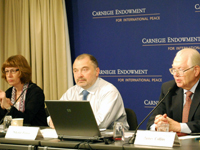Registration
You will receive an email confirming your registration.
As Vladimir Putin prepares to return to the presidency in the 2012 elections, the prospects for Russia’s future are unclear. Russia in 2020 brings together nearly thirty leading experts from Russia, the United States, and Europe to analyze the possible scenarios for Russia’s development and the risks that lie ahead. Despite Putin’s imminent return, the authors argue that the so-called Putin era is over. This does not mean that Putin will soon give up power, but rather that the political and economic system he created is incapable of dealing with Russia’s rapidly changing conditions.
Carnegie hosted several experts in a panel session that addressed the challenges facing Russia in the coming decade, such as the rise of ethnic nationalism, a looming economic crisis, and fractured civil society. Carnegie’s James F. Collins moderated the discussion.
Current Challenges & Future Scenarios
- Political Trajectories: Russia’s future remains uncertain as the Kremlin weighs the costs and benefits of pursuing modernization. Carnegie Moscow’s Nikolai Petrov offered three possible scenarios for Russia’s political development.
- “Stalin-Lite” Scenario: In this scenario, Russia would see a continuation of current trends under Putin, he said. Although there is no appetite for “full-fledged authoritarianism” in Russia today, this trajectory would lead to more authoritarian tendencies, which are not sustainable in the long run.
- “Early Putin” Scenario: This moderate scenario entails partial modernization under the regime’s control and is arguably the Kremlin’s most likely course of action, he argued.
- “Perestroika 2” Scenario: In this scenario, Russia would see a major transformation of Russia’s political and economic system, which would threaten the regime’s hold on power, Petrov said. Putin will be reluctant to choose this path.
- “Stalin-Lite” Scenario: In this scenario, Russia would see a continuation of current trends under Putin, he said. Although there is no appetite for “full-fledged authoritarianism” in Russia today, this trajectory would lead to more authoritarian tendencies, which are not sustainable in the long run.
- Rise of Nationalism: According to Carnegie Moscow’s Masha Lipman, approximately 35 percent of Russians express nationalist sentiments; although average citizens are still reluctant to actively support the nationalist cause. Such nationalist feelings are visible across the political spectrum, even among liberals and communists, Petrov added. Nevertheless, on November 4, 2011 the so called Russian March, which saw 7,000 nationalists marching against the Kremlin and shouting anti-government and xenophobic slogans such as “Russia for Russians!,” demonstrated that nationalists are becoming increasingly frustrated with Putin’s regime.
- An Economy at Risk: Clifford Gaddy from the Brookings Institution argued that three chief factors will shape Russia’s economy in the coming decade: rents from oil and gas; inefficient Soviet structural legacies; and the rent management system. He described the Russian economy as an “inverted funnel” through which oil and gas rents flow to the mainstream economy. He added that the Russian economy will not enjoy the same levels of growth after 2012 that it did during the last decade, and unless Putin adopts serious political reform or oil and gas rents increase significantly, Russia will face a major economic crisis in the near future.
- 2012 Election: Next year’s presidential election – which Putin will likely win – is completely devoid of political intrigue, stated Petrov. The regime is running on a familiar campaign of “no change,” but many elites are unhappy with the status quo, added Sam Greene from the New Economic School (Moscow). Ordinary Russians are not talking about the election and parties are spending less money on political campaigns. Russia lacks a “change constituency” that can provide a viable alternative to Putin’s regime, Greene concluded.
State and Society
- Social Media and Collective Action: Despite the increased number of online blogs in Russia – 7 million in total – the internet has not yet become a major forum for political mobilization, argued Lipman. The internet community, like Russian society at large, is “fragmented, depoliticized, and cynical.” A popular uprising in Russia akin to the “Arab Spring” is unlikely, she concluded.
- Weak Civil Society: Greene described Russian citizens as “aggressively immobile.” Due to Russia’s lack of strong institutions, Russians feel that they are responsible for their own well-being. As a result, “Russians are very much incentivized to hold on to what they’ve got rather than to seek other collective solutions.” The relationship between state and society does not resemble a social contract but rather a “divorce settlement” or “non-interference pact” in which Russian citizens stay out of politics in exchange for relative stability, Greene said.
- Russia’s Middle Class: A consumer society is gradually developing in Russia, noted Greene. The middle class consists of at least three groups – entrepreneurs, businessmen, and bureaucrats – that are often “at cross-purposes,” he added. Unfortunately, much of the middle class “consciously refrains from becoming too prosperous” for fear of attracting negative attention from the authorities, argued Gaddy.
